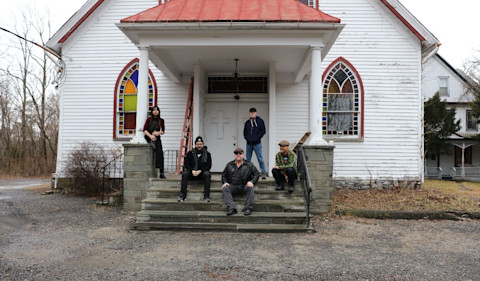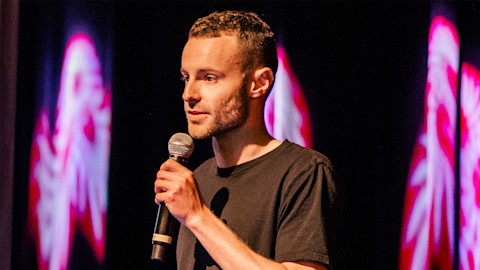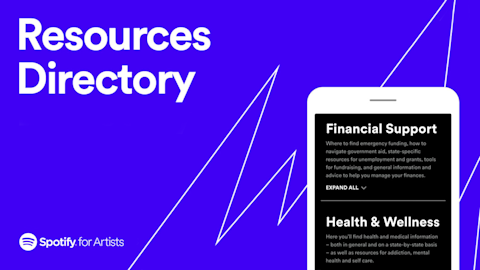Jae Matthews and Augustus Muller have found the advantages in living and working outside the mainstream.
If Boy Harsher were your typical underground artists, they’d be calling the streets of Brooklyn, Los Angeles, or Berlin home—their sublimely restless fusion of minimal electronics and industrial sounds feels at one with the glass and steel of the densest urban mazes. Yet ever since Jae Matthews and Augustus Muller met in 2013, they’ve steered clear of the speed, noise, and pollution of big cities. After attending college in idyllic Savannah, Georgia, where they cut their teeth in the local noise scene, the pair moved to Northampton, Massachusetts, a crunchy college town that seems an unlikely base for their dark, sleek music.
And yet Matthews and Muller have been able to pull their project out of the underground and into a spotlight that, while not necessarily mainstream, edges awfully close to it. They clearly don’t need to live in a big city in order to command attention. “Pain” was originally released on a limited-run cassette in 2014, and ended up going viral on YouTube (well over 5 million streams and counting). They also secured a licensing deal with Victoria’s Secret, and the retailer featured their moodily throbbing “Motion” in a television commercial in 2018.
None of this has been easy for Boy Harsher. They push themselves hard and have had to make sacrifices. Because they don’t live in a place where paying gigs can be snagged locally, they endure long, grueling tour schedules. And when they’re home, huge chunks of time are spent running their own label, Nude Club Records, and working on their strikingly cinematic videos. Matthews and Muller are also life partners, adding additional complexity to a relationship that has, as they’ve candidly revealed in the past, been fraught with personal challenges.
With their latest full-length, Careful, now out and a slew of 2019 gigs already under their belt, Matthews and Muller took time out of their frenzied schedule to chat about the challenges of crafting their sound, balancing their personal and professional relationships, and building a lasting career outside the country’s major media and entertainment centers.
Spotify for Artists: Do you prefer small towns and nature?
Augustus Muller: We had planned to move to New York City after Savannah, but we couldn’t save up enough money. So we moved back to my hometown [Northampton]. We’ve since realized the space and privacy have their advantages.
Jae Matthews: I like small places. I like to know how to find silence and solitude. But when I want community, I like to recognize the faces around me. I am like a sleepy old man at home who just happens to turn into a monster during tour season.
In our media-saturated society, does the solitude and silence feel essential?
Muller: I think most artists prefer privacy when creating, but that’s not always possible. On the other hand, there’s music that’s a side effect of our hyperactive culture. Artists like SOPHIE and Oneohtrix Point Never turn the schizophrenia of our media-driven world into something beautiful.
Matthews: Only speaking personally, the opportunity to slow down and experience calm helps. The noise of cities can bounce around my brain forever, and I don’t know how to regain composure. I’d walk around Mount Tom [in Western Massachusetts] every day, if I could. It provides perspective. There are elements in nature that you cannot predict nor understand. You can’t manage everything, and that’s what walking alone in the woods tells you.
Do you ever wish you could be closer to like-minded artists?
Matthews: I do wish we could be closer to friends. We recently spent a weekend—like, normal friend-time—with Heather Gabel from HIDE. It was rough leaving. I was like, why can’t I be physically closer to this person? We could goof off and make music together. We could eat dinner and drink wine, and I could feel less alone. The lack of opportunities to be around them is a real issue. Music festivals generally afford us fleeting reunions. You get to see your friends perform, which is important, and you also can get giddy in odd locations, like the woods or far-off cities.
What do the successes of the tracks “Pain” and “Motion” mean for your career?
Muller: The popularity of “Pain” amazes me every day. That song was written spontaneously, and we have no expectations for it. Originally, it was self-released on a tour tape in a run of 60. As for “Motion,” we have to support ourselves, and licensing is crucial, if we don’t want to tour constantly. There’s no job security in music. It feels like the bottom could drop out at any moment.
Matthews: And, of course, everyone saw that commercial, because everyone sheepishly watches The Bachelor or whatever, so I was getting hit up left and right. I think the truth about music synchronization licenses [syncs] is that they are necessary. Whether you admit it or not, we’re all kind of slaves to the same system. You can decide how much you work into it, but unless you are endowed with financial security from an early age, the arts are a wildly unstable career, and you rely on these weird things to make it work.
What are the challenges of maintaining a creative relationship with your partner?
Muller: We set boundaries—”shop hours.” We have to leave time for ourselves. But it can be hard enforcing them. Some days we work on the band every waking hour, and that’s unhealthy.
Matthews: We work well together, and we are lucky for that. Yet I sometimes find myself wishing I could take a break and be around a place and person that doesn’t remind me of a task I am forgetting or a piece I’m not writing. It sounds spoiled, so please don’t get me wrong: I feel blessed, just a little tired.
Your video work is cinematic and striking, and you’ve described yourselves as being “score-driven.” Can you talk about the importance of visuals to the band’s identity?
Muller: We approach Boy Harsher as a multimedia project, so naturally the visual aspect is important. We’ve directed a few of our own videos when we’ve had a strong idea. With the videos for “Fate” and “LA,” the directors conceived the narratives.
Matthews: When working with other directors we do some guidance in terms of what we want. But we also try to let the filmmakers generate their content. If we had the time and resources, we’d make more videos. The reality is that we need to work with others who want to allow Boy Harsher to come alive visually.
Do you think being a multimedia entity is mandatory for bands nowadays?
Muller: I don’t think it’s mandatory, but it can be a huge boost. A tour poster or album cover is going to get more exposure than the music itself.
Matthews: I think it is, to be honest. Stay true to your sound, and if there are visuals that make sense, then work on them. Your audience can read bullshit, so don’t force anything that isn’t authentically you.
—Justin Farrar
Popular Stories
video
How Julia Wolf Made It




